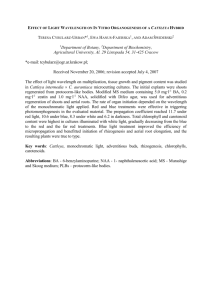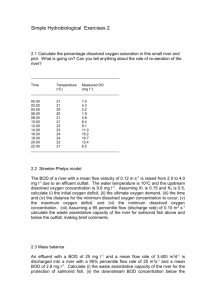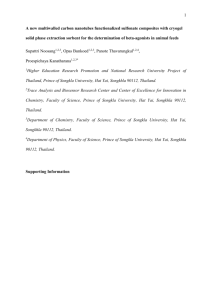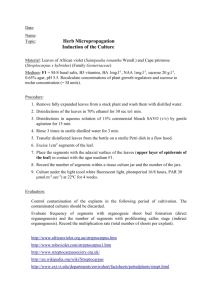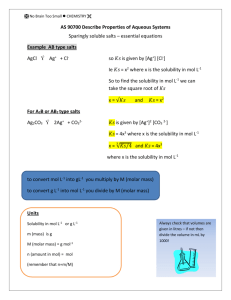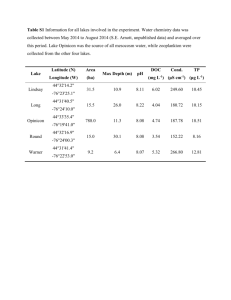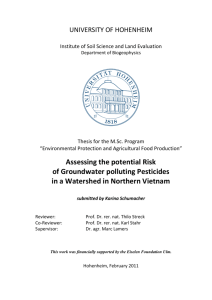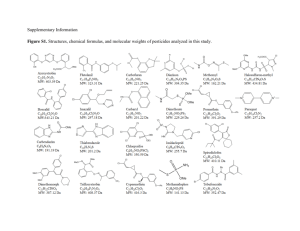Electronic Supplementary Material Ultrasound
advertisement
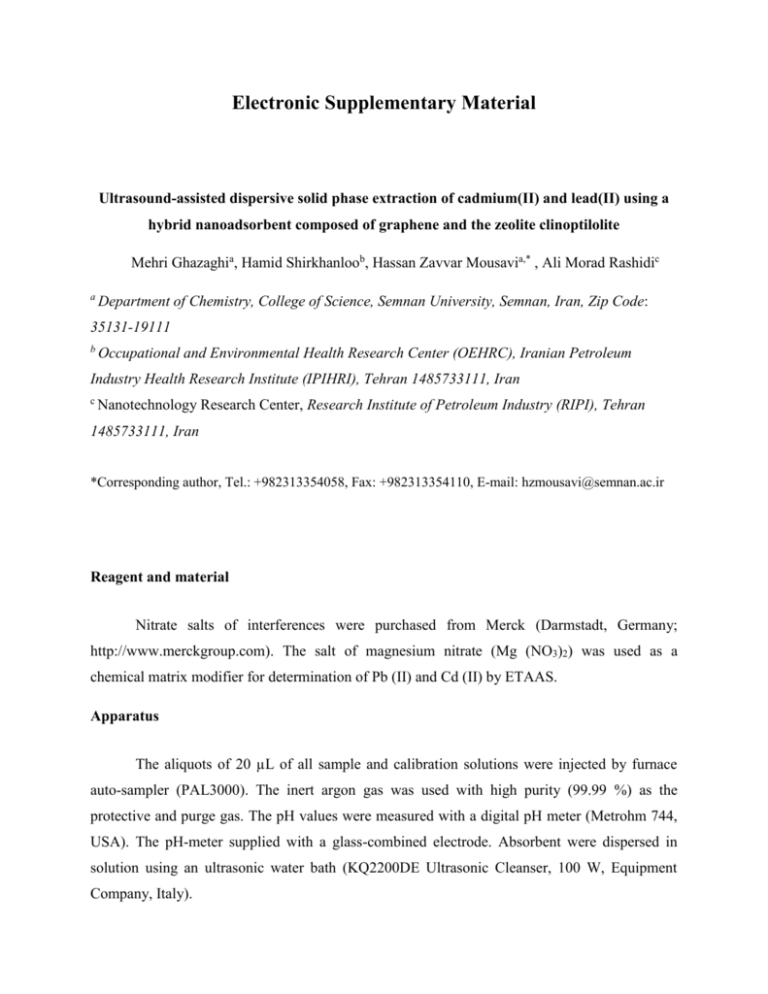
Electronic Supplementary Material Ultrasound-assisted dispersive solid phase extraction of cadmium(II) and lead(II) using a hybrid nanoadsorbent composed of graphene and the zeolite clinoptilolite Mehri Ghazaghia, Hamid Shirkhanloob, Hassan Zavvar Mousavia,* , Ali Morad Rashidic a Department of Chemistry, College of Science, Semnan University, Semnan, Iran, Zip Code: 35131-19111 b Occupational and Environmental Health Research Center (OEHRC), Iranian Petroleum Industry Health Research Institute (IPIHRI), Tehran 1485733111, Iran c Nanotechnology Research Center, Research Institute of Petroleum Industry (RIPI), Tehran 1485733111, Iran *Corresponding author, Tel.: +982313354058, Fax: +982313354110, E-mail: hzmousavi@semnan.ac.ir Reagent and material Nitrate salts of interferences were purchased from Merck (Darmstadt, Germany; http://www.merckgroup.com). The salt of magnesium nitrate (Mg (NO3)2) was used as a chemical matrix modifier for determination of Pb (II) and Cd (II) by ETAAS. Apparatus The aliquots of 20 µL of all sample and calibration solutions were injected by furnace auto-sampler (PAL3000). The inert argon gas was used with high purity (99.99 %) as the protective and purge gas. The pH values were measured with a digital pH meter (Metrohm 744, USA). The pH-meter supplied with a glass-combined electrode. Absorbent were dispersed in solution using an ultrasonic water bath (KQ2200DE Ultrasonic Cleanser, 100 W, Equipment Company, Italy). Table S1 The ETAAS conditions for determination of mentioned metal ETAAS Parameter Cd Pb 228.8 283.3 0.5 0.5 3 mA 5 mA 0.22-9.5 4-206 20 μL 20 μL Peak Area Peak Area Argon Argon Drying 110 120 Pyrolysis 750 900 Atomization 1900 2200 Cleaning 2000 2300 Wavelength Slit Lamp current Working range Volume Injection Mode Gas Temperature (◦C) Fig. S1 Effect of amount of sorbent on the recovery of 0.5 µg L-1 of lead and 0.2 µg L-1 of cadmium. Conditions: pH: 5.0; volume: 2.0 mL; volume of eluent: 100 µL. Fig. S2 Effect of concentration of acid on the recovery of 0.5 µg L-1 of lead and 0.2 µg L-1 of cadmium. Conditions: pH: 5.0; volume: 2.0 mL; amount of adsorbent: 5.0 mg; volume of eluent: 100 µL. Fig. S3 Effect of volume of acid on the recovery of 0.5 µg L-1 of lead and 0.2 µg L-1 of cadmium. Conditions: pH: 5.0; volume: 2.0 mL; amount of adsorbent: 5.0 mg; concentration of acid: 0.5 mol L-1. Fig. S4 Effect of Extraction time on the recovery of 0.5 µg L-1 of lead and 0.2 µg L-1 of cadmium. Conditions: pH: 5.0; volume: 2.0 mL; amount of adsorbent: 5.0 mg; concentration of acid: 0.5 mol L-1 Table S2 Comparison of US-assisted-DµSPE coupled G-CL with published method for metal ions in different matrixes Metal ions Method Sorbent Detection Matrix LOD RSD % Calibration range PF/EF Sample volume Ref. Cd, Co, Cr, Ni, Pb, Zn SPE decanoic acid-coated Fe3O4 NPs ICP-OES water 0.2-0.8 µg L-1 3.1 (N=6) 1-400 µg L-1 116150 b 10 mL ][42 0.15, 0.17 µg L-1 2.8, 3.2 0.5-200 µg L-1 250 b 500 mL ][43 µg L-1 0.16, 0.2 4.6-7.4 - 200 b 100 mL ][44 Water and herbal samples Water and milk powder Pb and Cd SPE modified nano-alumina FAAS Cd, Mn and Pb SPE Fe3O4@SiO2@IDA ICP-MS Pb SPE ion-imprinted particles FAAS Water 50.2 µg L-1 3.8 0.05-2.5 mg L-1 10 b 100 mL ][45 Cu2+, Co2+, Ni2+, Pb2+ SPE MWNT FAAS Water 1.64–5.68 µg L−1 - - 40 b 400 mL ][46 Cd(II), Pb(II), Zn(II) and Ni(II) SPE MWNT FAAS Food samples - - 16.5 b 50 mL ][47 Pb and Cd SPE solid sulfur FAAS Water 5.1 , 4.7 Pb : 10-300 µg L-1 Cd :1-20 µg L-1 500 b 1000 mL ][10 Cd: 2.8, Pb: 7.2, Zn:1.1, Ni: 4.3 68 µg L−1 Pb: 3.2 µg L-1 Cd: 02 µg L−1 Cd, Co, Ni and Pb FI online microcolumn SPE black stone (Pierre noire) ICP-OES Human urine 0.3-1.13 µg L−1 2.7-5.9 - - 3 mL ][48 of Cd(II) and Pb(II) SM–SPE1 Fe3O4 nano-particle FAAS Water and soil samples 0.15 , 0.74 µg L−1 3.15, 3.82 Pb : 1–10 mg/L Cd : 0.1–1.0 mg/L 25 b 10 mL ][49 Cd FI-SPE2 oxidized carbon nanotubes ETAAS Serum samples 10 ng L−1 4.0 - 40 a 2 mL ][50 3.2-4.02 Cd: 0.05–500 µg L-1 Pb: 0.05–500 µg L-1 Cu: 0.01–100 µg L-1 4539, 5483 b 5 mL ][51 < 3.2 - 100 a 150 mL ][7 Cu: 0.01-0.34 mg L−1 Zn :0.01-0.3 mg L−1 Mn:0.02-0.31 mg L−1 0.01-0.5 mg L-1 0.015-0.6 mg L-1 0.02-0.4 mg L-1 0.02-0.6 mg L-1 35 b 39 b 27 b 1350 mL [37] - 250 mL [38] 20 b 2 mL Present work 3 Cd, Cu and Pb HF-SPME Pb and Cd Column SPE 4 MWNT DPASV Rice MnO2-CNT ETAAS Water Column SPE DCPIMI -Amberlite FAAS Water and fruits Zn, Ni, Fe and Pb Dispersive SPE SDS-coated alumina FAAS water and food Pb and Cd USA-D-µSPE GrapheneClinoptilolite hybrid ETAAS Water and human serum Cu, Zn and Mn 5 a Preconcentration Factor b Enhancement factor 1 Surfactant mediated solid phase extraction 2 Flow injection solid phase extraction 3 Hollow fiber solid phase microextraction 4 Differential pulse anodic stripping voltammetry 5 3-((2,6-Dichlorophenyl)(1H-indol-3-yl)methyl)-1H-indole (DCPIMI) Cd:0.01 µg L−1 Pb:0.025 µg L−1 Cu:0.0073 µg L−1 Pb: 4.4 µg L−1 Cd: 1.5 µg L−1 Cu: 1.9 µg L−1 Zn :1.5 µg L−1 Mn:2.6 µg L−1 Zn: 1.6 µg L−1 Ni: 2.1 µg L−1 Fe: 2.6 µg L−1 Pb: 2.8 µg L−1 Pb: 0.07 µg L−1 Cd:0.004 µg L−1 ≤3.0 - 3.4, 3.9 Pb: 0.24-10.3 µg L-1 Cd: 0.011-0.48 µg L-1 References [42] Faraji M, Yamini Y, Saleh A, Rezaee M, Ghambarian M, Hassani R (2010) A nanoparticle-based solid-phase extraction procedure followed by flow injection inductively coupled plasma-optical emission spectrometry to determine some heavy metal ions in water samples. Anal Chim Acta 659:172-177 [43] Ezoddin M, Shemirani F, Abdi K, Saghezchi MK, Jamali MR (2010) Application of modified nanoalumina as a solid phase extraction sorbent for the preconcentration of Cd and Pb in water and herbal samples prior to flame atomic absorption spectrometry determination. J Hazard Mater 178:900-905 [44] Zhang N, Peng H, Wang S, Hu B (2011) Fast and selective magnetic solid phase extraction of trace Cd, Mn and Pb in environmental and biological samples and their determination by ICP-MS. Microchim Acta 175:121-128 [45] Esen C, Andac M, Bereli N, Say R, Henden E, Denizli A (2009) Highly selective ion-imprinted particles for solid-phase extraction of Pb2+ ions. Mater Sci Eng C 29:2464-2470 [46] Duran A, Tuzen M, Soylak M (2009) Preconcentration of some trace elements via using multiwalled carbon nanotubes as solid phase extraction adsorbent. J Hazard Mater 169:466-471 [47] Alothman Z, Habila M, Yilmaz E, Soylak M (2012) Solid phase extraction of Cd(II), Pb(II), Zn(II) and Ni(II) from food samples using multiwalled carbon nanotubes impregnated with 4-(2thiazolylazo)resorcinol. Microchim Acta 177:397-403 [48] Suleiman JS, Hu B, Huang C, Zhang N (2008) Determination of Cd, Co, Ni and Pb in biological samples by microcolumn packed with black stone (Pierre noire) online coupled with ICP-OES. J Hazard Mater 157:410-417 [49] Jalbani N, Soylak M (2014) Ligandless surfactant mediated solid phase extraction combined with Fe3O4 nano-particle for the preconcentration and determination of cadmium and lead in water and soil samples followed by flame atomic absorption spectrometry: Multivariate strategy. Ecotox Environ Saf 102:174-178 [50] Acosta M, Savio M, Talio MC, Ferramola ML, Gil RA, Martinez LD (2013) On-line solid phase extraction of Cd from protein fractions of serum using oxidized carbon nanotubes coupled to electrothermal atomization atomic absorption spectrometry. Microchem J 110:94-98 [51] Es’haghi Z, Khalili M, Khazaeifar A, Rounaghi GH (2011)Simultaneous extraction and determination of lead, cadmium and copper in rice samples by a new pre-concentration technique: Hollow fiber solid phase microextraction combined with differential pulse anodic stripping voltammetry. Electrochim Acta 56:3139-3146
